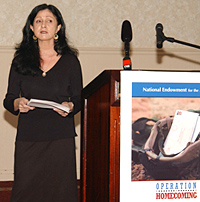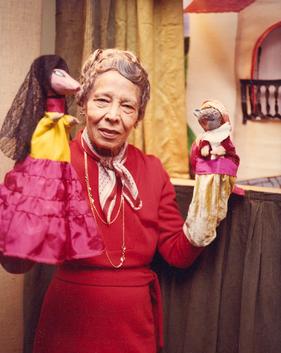
The Nuyorican movement is a cultural and intellectual movement involving poets, writers, musicians and artists who are Puerto Rican or of Puerto Rican descent, who live in or near New York City, and either call themselves or are known as Nuyoricans. It originated in the late 1960s and early 1970s in neighborhoods such as Loisaida, East Harlem, Williamsburg, and the South Bronx as a means to validate Puerto Rican experience in the United States, particularly for poor and working-class people who suffered from marginalization, ostracism, and discrimination.

Jesús Colón (1901–1974) was a Puerto Rican writer known as the Father of the Nuyorican movement. An activist and community organizer, Colón wrote poetry and stories about his experiences as an Afro-Puerto Rican living in New York.

Luisa Capetillo was one of Puerto Rico's most famous labour leaders. She was an anarchist writer, activist, labour organiser who fought for workers' rights, women's rights, free love, and human emancipation.

Puerto Rican literature is the body of literature produced by writers of Puerto Rican descent. It evolved from the art of oral storytelling. Written works by the indigenous inhabitants of Puerto Rico were originally prohibited and repressed by the Spanish colonial government.

Judith Ortiz Cofer was a Puerto Rican author. Her critically acclaimed and award-winning work spans a range of literary genres including poetry, short stories, autobiography, essays, and young-adult fiction. Ortiz Cofer was the Emeritus Regents' and Franklin Professor of English and Creative Writing at the University of Georgia, where she taught undergraduate and graduate creative writing workshops for 26 years. In 2010, Ortiz Cofer was inducted into the Georgia Writers Hall of Fame, and in 2013, she won the university's 2014 Southeastern Conference Faculty Achievement Award.
Caridad de la Luz, a.k.a. "La Bruja", is a Nuyorican poet, playwright, actress and activist. She is considered one of the leading spoken word poets in the world. In 2005, El Diario La Prensa, the largest Spanish-language newspaper in New York City, named De la Luz as one of the "Fifty Most Distinguished Latinas in the United States".

Pura Teresa Belpré y Nogueras was an Afro-Puerto Rican educator who served as the first Puerto Rican librarian in New York City. She was also a writer, collector of folktales, and puppeteer.
Nicholasa Mohr is one of the best known Nuyorican writers, born in the United States to Puerto Rican parents. In 1973, she became the first Nuyorican woman in the 20th century to have her literary works published by the major commercial publishing houses, and has had the longest creative writing career of any Nuyorican female writer for these publishing houses. She centers her works on the female experience as a child and adult in Puerto Rican communities in New York City, with much of writing containing semi-autobiographical content. In addition to her prominent novels and short stories, she has written screenplays, plays, and television scripts.
Luz María "Luzma" Umpierre-Herrera is a Puerto Rican advocate for human rights, a New-Humanist educator, poet, and scholar. Her works pans a range of critical social issues, including activism and social equality, the immigrant experience, bilingualism in the United States, and LGBT matters. Luzma has made significant contributions to literature, authoring six poetry collections and two books on literary criticism, in addition to having many essays featured in academic journals.
Sandra María Esteves is a Latina poet and graphic artist. She was born and raised in the Bronx, New York, and is one of the founders of the Nuyorican poetry movement. She has published collections of poetry and has conducted literary programs at New York City Board of Education, the Caribbean Cultural Center, and El Museo del Barrio. Esteves has served as the executive director of the African Caribbean Poetry Theater. She is the author of Bluestown Mockinbird Mambo and Yerba Buena. She lives in the Bronx.
Aurora Levins Morales is a Puerto Rican writer and poet. She is significant within Latina feminism and Third World feminism as well as other social justice movements.
The Myth of the Latin Woman is a non-fiction essay written by Puerto Rican author Judith Ortiz Cofer.

When I Was Puerto Rican is a 1993 autobiography written by Puerto Rican native Esmeralda Santiago. It is the first of three installments, followed by Almost a Woman and The Turkish Lover. This first book begins by describing Santiago's life in Macún, a sector of Candelaria barrio in Toa Baja, Puerto Rico. It details the circumstances that led to her mother bringing her and her siblings to New York. The second part of the book describes Santiago's initial adjustment to life in America. The memoir closes with Santiago's audition to New York's Performing Arts High School.

Yo-Yo Boing! (1998) is a postmodern novel in English, Spanish, and Spanglish by Puerto Rican author Giannina Braschi. The cross-genre work is a structural hybrid of poetry, political philosophy, musical, manifesto, treatise, memoir, and drama. The work addresses tensions between Anglo-American and Hispanic-American cultures in the United States.

The recorded history of Puerto Rican women can trace its roots back to the era of the Taíno, the indigenous people of the Caribbean, who inhabited the island that they called Boriken before the arrival of Spaniards. During the Spanish colonization the cultures and customs of the Taíno, Spanish, African and women from non-Hispanic European countries blended into what became the culture and customs of Puerto Rico.
Rosario Morales was a Puerto Rican author and poet. She is best known for her book Getting Home Alive which she co-authored with her daughter Aurora Levins Morales in 1986. She was also significant within the Latina feminist movement and the Communist Party. She describes her own complicated identity in her poem "I am what I am", “I am Puerto Rican I am U.S. American… I am Boricua as Boricuas come… I am naturalized Jewish American… I am what I am. Take it or leave me alone."
Clotilde Betances Jaeger was a feminist writer and journalist of New York's Puerto Rican intellectual community during the mid-twentieth century. She advocated for Hispanic women's rights. Once a teacher and a lifetime educational advocate, she pushed for minority children's education in New York and supported educational reforms in Puerto Rico. She is best-known for her written work in newspapers and journals in Puerto Rico and New York. though she was also featured in other Latin American and European publications. Betances Jaeger was also a grand-niece of Ramón Emeterio Betances, a Puerto Rican independence leader.

Irene M. Zoppi Rodríguez, is a retired U.S. Army Reserve brigadier general and academic. She was the first Puerto Rican woman ever to attain that rank in the Army Reserve. Her final assignment was deputy commanding general for United States Army South as the director of the Army Reserve Engagement Cell for Individual Mobilization Augmentees. Zoppi is an adjunct professor at Strayer University. She has worked as an instructor for the National Intelligence University where she directed the university's academic center within the National Security Agency.
La Borinqueña is a 2016 graphic novel by Edgardo Miranda-Rodriguez.
Bárbara "Soraya" Santiago Solla was a pioneer of the transgender community in Puerto Rico as well as the first person in Puerto Rico to change the gender designation on their birth certificate following gender reassignment surgery.











